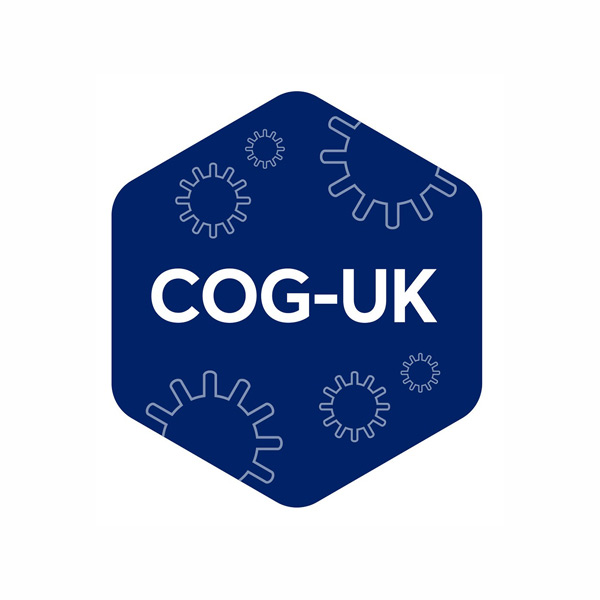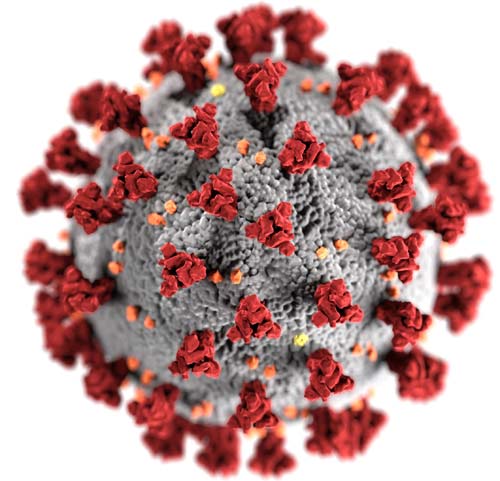
COVID-19 Genomics UK (COG-UK) Consortium
The Goal
The goal of the COG-UK Consortium was to deliver large-scale SARS-CoV-2 genome sequencing capacity to hospitals, regional NHS centres and the Government that, when combined with epidemiological and clinical information, informed interventions and policy decisions during the current UK COVID-19 epidemic.
The Consortium

The COG-UK Consortium was an innovative partnership of NHS organisations, the four Public Health Agencies of the UK, the Wellcome Sanger Institute and more than 12 academic institutions who provided sequencing and analysis capacity. It was led by Professor Sharon Peacock, Director of the COVID-19 Genomics UK (COG-UK) Consortium.
It was supported by £20 million funding from the UK Department of Health and Social Care (DHSC), UK Research and Innovation (UKRI) and the Wellcome Sanger Institute.
For a full list of collaborating organisations, researchers and funders, please see the COG-UK Consortium website
How the Consortium worked
Samples from patients with COVID-19 infection were collected by NHS laboratories, Public Health laboratories and national coronavirus Testing Centres as part of their routine diagnostic work. Genome sequencing was performed by a network of regional laboratories which currently includes Belfast, Birmingham, Cambridge, Cardiff, Edinburgh, Exeter, Glasgow, Liverpool, London, Norwich, Nottingham, Oxford and Sheffield, backed up by a national sequencing hub at the Sanger Institute.
Virus genome data was combined with clinical and epidemiological datasets in order to help to guide UK public health interventions and policies. Subsequent analyses enabled evaluation of novel treatments and non-pharmacological interventions on SARS-CoV-2 virus populations and spread, and provided information on introductions versus community transmission and outbreaks. These data also allowed researchers to identify and evaluate emerging genetic changes and understand how they affect the ability of the virus to transmit from person to person, and to cause severe forms of the disease.
COG-UK Aims
- Understand the national and international epidemiology and spread of the SARS-CoV-2 virus, including monitoring asymptomatic spread in the community.
- Determine the level of, and routes of, hospital- and healthcare-based (nosocomial) transmission of the virus to support hospital or bed closures and other events.
- Monitor interventions and their effectiveness in limiting COVID-19 – to understand their impact and guide their use.
- Determine the potential effect of future treatments, including emergence of resistance to vaccines or therapies by the virus.
- Understand the biological behaviour of the SARS-CoV-2 virus.
- Drive the development of advanced research techniques and insights through greater data integration (for example by combining health records, virus genomics, human genomics and metagenomics).
- Facilitate international collaboration on COVID-19 through open data sharing of UK SARS-CoV-2 sequencing data.
- In the longer term, build UK-wide capacity for managing major epidemics within the NHS, Public Health Agencies and academic institutions.
How COG-UK found and tracked new variants
How the Sanger Institute contributed to COG-UK
The Sanger Institute has one of the largest sequencing centres in the world, coupled with Europe’s largest biological data centre. It supplied its world leading expertise in sample logistics, metadata handling, bioinformatic analysis and interpretation to the COG-UK Consortium to enable rapid and standardised sample collection, sequencing, data linkage and visualisation. This was supported by a large team led by Cordelia Langford, Ian Johnston, Alex Alderton, Jeffrey Barrett, Matt Berriman, Mara Lawniczak, David Aanensen, John Sillitoe, John Danesh and Dominic Kwiatkowski. Ewan Harrison served as Project Manager responsible for overall coordination of the COG-UK network.
To see the full list of contributors, please click this link: Wellcome Sanger Institute COVID-19 Surveillance Team.
Providing a national sequencing hub
The Sanger Institute provided a centralised service for large-scale genome sequencing of samples from the ‘Lighthouse Lab’ National Testing Centres and from other diagnostic services in parts of the UK that were not covered by the COG-UK regional sequencing labs. It also served as a backup to take pressure off the regional sequencing labs during periods of high demand.
Several teams within the Institute’s Scientific Operations and Scientific Computing facilities worked to deliver and optimise the sequencing production pipeline, supported by faculty and staff from the Parasites and Microbes Programme:
- The DNA sequencing team is delivered whole genome sequencing at scale using short-read sequencing technologies.
- The DNA pipelines informatics team outputted the data to open-access repositories (GISAID and MRC-CLIMB) in standardised formats.
- The Cellular Generation and Phenotyping (CGAP) team developed processes to register and prepare incoming samples.
- The Long-read sequencing and DNA Pipelines Research and Development teams worked to improve the accuracy and turnaround time of high-throughput viral sequencing at scale using Single-Molecule Real-Time sequencing technologies.
Supporting metadata collection, data integration and data visualisation
Sanger faculty and staff within the Health Data Research UK (HDR UK) consortium explored and refined routes by which relevant and insightful information about the people who had been infected could be gathered and attached to the virus’ genome sequence data. These data enabled research into the specific actions of the virus and the groups of people most susceptible and helped to guide public health protection strategies.
Members of the Centre for Genomic Pathogen Surveillance deployed their Epicollect5 mobile app to facilitate collection of samples and metadata from NHS testing labs. They refined their Data-flo and MicroReact online platforms to generate real-time displays of the transmission and spread of the virus at the national and local level.
Providing genomic insights to inform Public Health interventions
The COVID-19 Genomics Initiative at the Wellcome Sanger Institute, led by Dr Jeff Barrett, developed tools and techniques to provide real-time genomic monitoring of SARS-CoV-2 in the UK to aid public health response. The team also monitored for genetic mutations which could cause the virus to be more easily transmitted or to escape vaccines
Contact
If you need help or have any queries, please contact us using the details below.
Sanger people

Dr Peter Clapham
ISG Team Leader

Professor John Danesh
Faculty

Dr Ewan Harrison
Head of the Respiratory Virus and Microbiome Initiative (Group leader)

Dr Mara Lawniczak
Senior Group Leader

Rich Livett
Technical Delivery Lead (Platform and software development)

Professor Sir Mike Stratton
Senior Group Leader
Previous Sanger people

Professor David Aanensen
Director of the Centre for Genomic Pathogen Surveillance and Former Group Leader

Dr Alex Alderton
Head of Cellular Operations

Dr Roberto Amato
Head of Data Analysis and Translation

Dr Matt Berriman
Former Senior Group Leader

Dr Tim Cutts
Head of Scientific Computing

Dr Martin Dougherty
Former Chief Operating Officer

Professor Dominic Kwiatkowski
Former Honorary Faculty

Dr Rachel Nelson
Head of CGaP, Cellular Generation & Phenotyping Core Facility
External partners and funders
External
Funder: UK Research and Innovation (UKRI)
UKRI works in partnership with universities, research organisations, businesses, charities, and government to create the best possible environment for research and innovation to flourish. We aim to maximise the contribution of each of our component parts, working individually and collectively. We work with our many partners to benefit everyone through knowledge, talent and ideas. Operating across the whole of the UK with a combined budget of more than £7 billion, UK Research and Innovation brings together the seven research councils, Innovate UK and Research England.
External
Funder: Wellcome
Wellcome exists to improve health by helping great ideas to thrive. We support researchers, we take on big health challenges, we campaign for better science, and we help everyone get involved with science and health research. We are a politically and financially independent foundation.
External
Partner: Belfast Health and Social Care Trust
The Belfast Health and Social Care Trust (BHSCT) Regional Virus Laboratory team are working in partnership with Queen’s University Belfast and BHSCT Regional Genetics Laboratory to sequence SARS-CoV-2 samples from patients in Northern Ireland as part of the COG-UK consortium.
External
Partner: Cardiff University
The Cardiff University team are supporting the project through the use of the MRC CLIMB node hosted at Cardiff, which will provide computational capacity for analysis and data storage for the consortium. The bioinformatics and sequencing staff in the School of Biosciences are also working as part of the PHW Pathogen Genomics effort to manage, sequence and analyse SARS-COV-2 samples collected in Wales.
External
Partner: EMBL-EBI
External
Partner: Genomics England Limited
External
Partner: Genomics Partnership Wales
Genomics Partnership Wales (GPW) is the entity setup by Welsh Government to deliver the Welsh Genomics for Precision Medicine Strategy. GPW is the umbrella for pathogen and human genomics work in the NHS in Wales, and is supporting the Pathogen Genomics work being undertaken in Wales.
External
Partner: Imperial College London
External
Partner: MRC-University of Glasgow Centre for Virus Research
The mission of the MRC-Centre for Virus research is to carry out fundamental research on viruses and viral diseases, translating the knowledge gained for the improvement of health and the benefit of society.
External
Partner: West of Scotland Specialist Virology Centre, NHS Greater Glasgow and Clyde
The West of Scotland Specialist Virology Centre is working with the MRC-University of Glasgow Centre for Virus Research.
External
Partner: Public Health England
Public Health England aims to address urgent threats to health in the 21st century. The organisation has been central to the national response to COVID-19, and has led this proposal to develop a national capability to sequence the causative virus and use this to inform public health interventions. The COVID-19 Genomics UK (COG-UK) Consortium will be led by Sharon Peacock as a collaborative initiative to capture information on the virus and from patients so as to reduce the impact from the COVID-19 epidemic in the UK.
External
Partner: Public Health Scotland
External
Partner: Public Health Wales NHS Trust
Public Health Wales NHS Trust (PHW) is the national public health authority for Wales. PHW works to protect and improve health and well-being and reduce health inequalities for the people of Wales. PHW is leading the national response to COVID-19 in Wales. PHW operates diagnostic laboratories across Wales and has been providing SARS-COV-2 testing in Wales. In addition, PHW epidemiology teams have been providing support across Wales to track cases and support management of the outbreak. Sequencing of Welsh samples is being undertaken by the Pathogen Genomics Unit (PenGU). PenGU was formally launched in 2018, and provides an accredited sequencing environment for a range of clinical pathogen genomics services for the whole of Wales. The Pathogen Genomics team in Public Health Wales will be contributing to COG-UK by sequencing and analysing Welsh SARS-COV-2 cases. Data that is being generated is being fed back in real time to clinical colleagues across the NHS in Wales as well as feeding into outbreak management and planning within the Welsh NHS and Welsh Government. In addition to sequencing samples, the team are providing bioinformatics support to build production-ready pipelines for processing samples, supporting the development of systems on CLIMB for consortium use and leading efforts to enable metadata sharing across the UK.
External
Partner: Quadram Institute
External
Partner: Queen's University Belfast
External
Partner: University College London
The UCL team have been working in joint partnership with Virology at Imperial College Healthcare NHS Trust; Dr David Muir and Dr Paul Rendell to deliver the pipeline of sequencing data. UCL and Imperial are also leading the COG-UK Hospital-Onset COVID-19 Infections (HOCI) Study; A phase III prospective, interventional, cohort, superiority study to evaluate the benefit of rapid COVID-19 genomic sequencing (the COVID-19 GENOMICS UK project) on infection control in preventing the spread of the virus in United Kingdom NHS hospitals. COG-UK collaborators include Glasgow, Sheffield and Guys and St Thomas’ Trust.
External
Partner: University of Birmingham
The University of Birmingham team will be drawing on ARTIC and CLIMB. The CLIMB project, which recently secured funding for a further five years with the CLIMB-BIG-DATA project, will provide the data analysis pipelines, computing and storage capacity required. The ARTIC project, funded by a Wellcome Trust Collaborative Award, is a collaborative project to put genomics at the heart of outbreak response.
External
Partner: University of Cambridge
External
Partner: University of Edinburgh
External
Partner: University of Exeter
The University of Exeter team is working closely with the Clinical Diagnostics teams at the Royal Devon and Exeter NHS Trust and in the surrounding area.
External
Partner: University of Liverpool
External
University of Northumbria
The DNA sequencing research facility at Northumbria University, NU-OMICS, is linked to both academic and industrially linked DNA sequencing projects.
External
Partner: University of Nottingham
The University of Nottingham team is working closely with the Clinical Pathology team at Nottingham University Hospitals. The University of Nottingham next generation sequencing platform, DeepSeq, is providing sequencing expertise and the Virology groups are helping support access to samples.
External
Partner: University of Oxford
External
Partner: University of Portsmouth
The University of Portsmouth Team are currently working in partnership with Portsmouth Hospitals NHS Trust.
External
Partner: University of Sheffield
The University of Sheffield team is working in partnership with the Sheffield Teaching Hospitals NHS Foundation Trust’s regional NHS virology laboratory based at the Northern General Hospital.
External
Partner: Public Health Agency
Related groups
The following teams are contributing members to the consortium's work